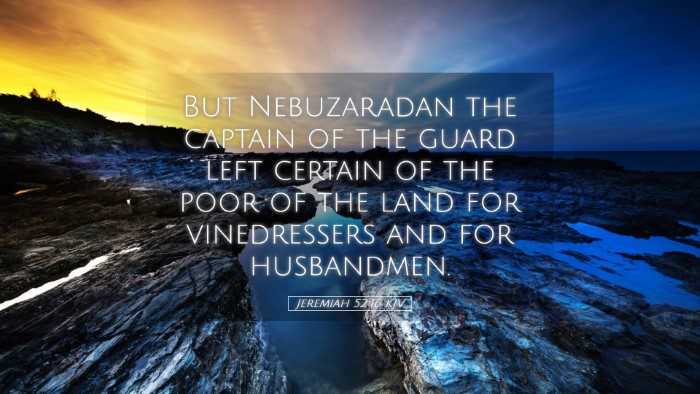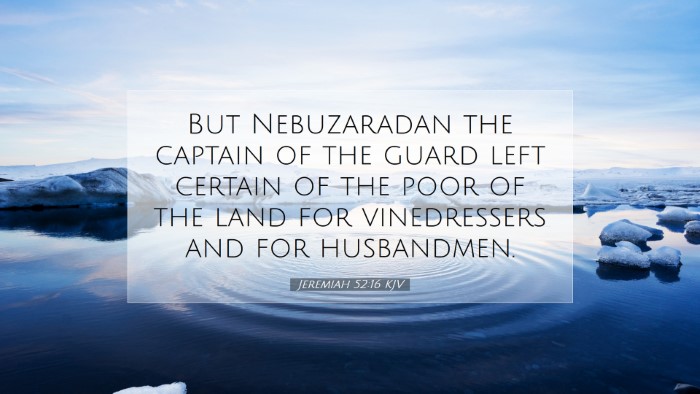Commentary on Jeremiah 52:16
Jeremiah 52:16 states: "But Nebuzaradan the captain of the guard left of the poor of the people, which had nothing, in the land of Judah, and gave them vineyards and fields at the same time." This verse chronicles a significant aspect of the aftermath of the Babylonian conquest, emphasizing God's providence even in the midst of judgment.
Overview and Context
The concluding chapter of the book of Jeremiah encapsulates the destruction of Jerusalem and its temple, highlighting the divine justice at work. The devastation wrought by Nebuchadnezzar was not merely destruction; it was a fulfillment of prophetic warnings that had been issued for decades. Yet, amid this calamity, the text reveals a sliver of hope through the actions of Nebuzaradan.
Insights from Public Domain Commentaries
Matthew Henry's Commentary
Matthew Henry emphasizes the importance of the captives left behind, viewing them as a remnant of the people who would preserve the heritage of Judah. He notes that "God is merciful even in destruction," as He allows a poor and meek remnant to remain and gives them fields and vineyards, suggesting a restoration of life despite the calamity they faced. This act stands as a testimony to God's enduring covenant with His people, preserving a seed for future generations.
Albert Barnes' Notes
Albert Barnes offers a detailed analysis of the terms used in this passage. He points out that the designation of those left as "the poor of the people" underscores their plight and vulnerability at this moment. Barnes argues that "the act of providing them vineyards and fields illustrates a principle of care and mercy prevalent in God's character." This act symbolizes the hope of restoration and the continuity of God’s provisions for His people. Barnes also highlights that this action by Nebuzaradan can be seen as a fulfillment of the promise inherent in God's relationship with Judah—the idea that even in punishment, there can be mercy.
Adam Clarke's Commentary
Adam Clarke points to the providential aspect of this verse, stating that it represents God’s mercy intervening in a dire situation. Clarke asserts that "the preservation of the poor and their uplift through material provisions reflect a larger theme of divine favor." He further explores the societal implications of these actions, suggesting that they serve as an example of how God cares for those who are marginalized and destitute. Clarke's comment directing attention towards God’s ultimate justice, frames this act as a precursor to healing and restoration for the nation of Israel.
Theological Reflections
Jeremiah 52:16 offers a rich ground for theological reflection on God's sovereignty, mercy, and the paradox of judgment and grace. The response of Nebuzaradan can be seen as an instruments of God’s providential care. Even among the ruins of Jerusalem, God's hand preserves a remnant. This resonates with the themes found throughout Scripture, including:
- The Remnant Theme: Throughout the Old Testament, often after judgment, God preserves a remnant. This speaks to His faithfulness to His covenant promises.
- Grace in Judgment: The provision of vineyards and fields reflects a profound truth: judgment is often accompanied by God's grace. Even in dire straits, there is evidence of God’s mercy.
- God’s Care for the Poor: This text underscores God's particular concern for the marginalized and impoverished, urging the faithful to reflect this concern in their ministry.
Practical Applications
This scripture invites pastors and theologians to consider several practical applications:
- Pastoral Care: There is a strong reminder to care for the vulnerable in our communities as an expression of God's love and mercy.
- Hope in Despair: It encourages believers to look for and create spaces of hope in seemingly hopeless situations, embodying the grace shown in Scripture.
- Understanding Justice: Reflecting on God’s justice can help believers engage with societal issues from a Biblical perspective, advocating for the oppressed.
Conclusion
Jeremiah 52:16 serves as a profound reminder of God's mercy amid judgment. The actions of Nebuzaradan—the captain of the guard—serve to illustrate how divine providence works through historical events, prompting theological reflection on God’s character and the nature of His covenant with His people. This verse encapsulates a pivotal moment of despair that evolves into a demonstration of hope, reconciliation, and restoration, themes that resonate through the entirety of Scripture. As pastors, students, and scholars reflect on these insights, they are encouraged to embody and proclaim the hope found in God’s redemptive work, even in the darkest of times.


